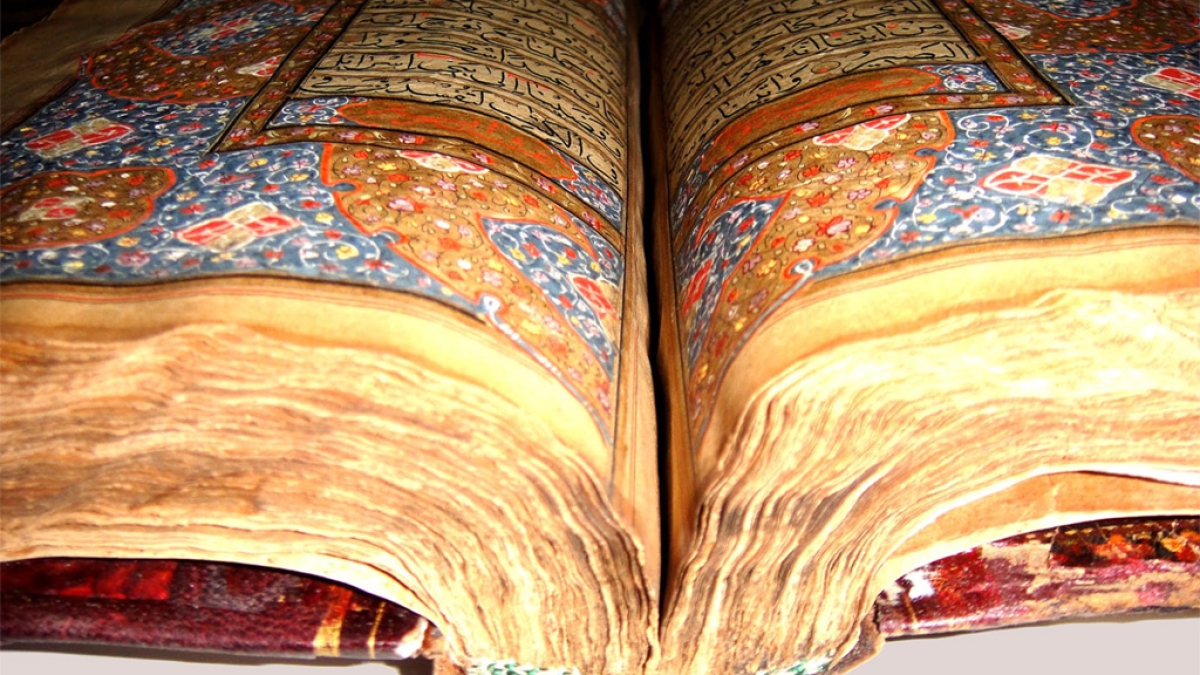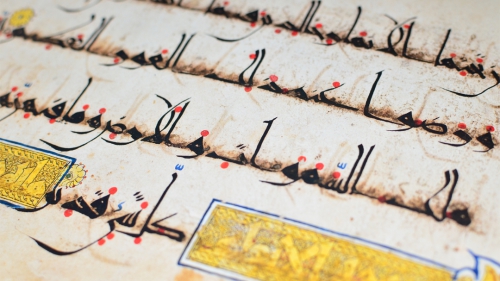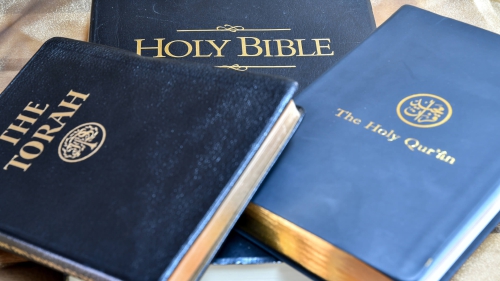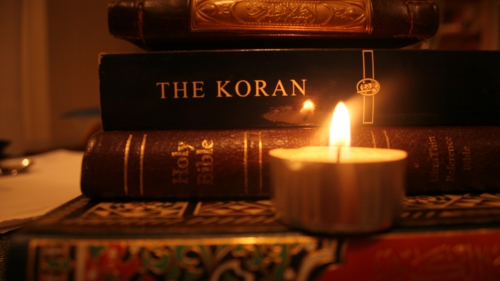Qur'anic Dialectics

In the Qur'an man appears in a variety of capacities: as prophet, messenger, sage; as Muslim, Momin, Jew, Christian, Magian, Sabian; as disbeliever, skeptic, hypocrite, idolater; as tyrant and his victims crying out for justice; as one whose self-regard has made him deaf, dumb and blind to the signs of God; as men whose hearts tremble with awe when God is mentioned.
God speaks to all of them.
Directly and indirectly, and at different levels, the contest for man's soul undergirds nearly all the exchanges in the Qur'an, whether these exchanges occur between God and the angels, God and Iblis, or God and man. Of necessity, these exchanges turn their attention to nearly everything in God's creation, seen and Unseen - from the design of the heavens to the manner in which cows are put together to produce pure milk, sweet to the drinker.
In order to bring man to the straight path, the Qur'an harnesses the resources of human language, reasoning, rhetoric, and prosody; it infers the Unknown from the known; it draws lessons from the history of human arrogance; it borrows images from this life to illustrate the felicity and pain of the Hereafter; it speaks to each interlocutor in a manner suited to his or her capacity and needs.
Since the Qur'an had to speak to audiences that were often hostile to its message - Arab pagans or followers of previous revelations jealous of a new revelation given to a people without a Scripture - it was forced to respond to their objections, using reason and rhetoric to bring them into the new faith.
Repeatedly and without flinching, the Qur'an records the objections and taunts of its adversaries: mushrikin who associate other divinities with God; munafiqin who entered Islam in order to undermine it from within; and the kafirin, disbelievers, among Jews and Christians. It also answers their objections.
In large parts, the Qur'anic mode of revelation is dialectical. God listens and speaks to men, answering their objections, addressing their concerns, guiding, giving comfort. Muhammad did not go up to the mountains to receive the Qur'an inscribed on tablets, nor was the Qur'an delivered as a manuscript written out on papyrus scrolls. Instead, at least as things appear to us, the Qur'an emerges out of the social matrix in which Muhammad finds himself - in Mecca and Medina - daily wrestling with the task of saving souls, unraveling the plans of his adversaries, and bringing guidance and comfort to those who had chosen to stand by his side.
God sent down portions of the Qur'an to Muhammad - communicated to him by the angel Gabriel - over a period of twenty-three years: the first revelation came in 610 when he was alone, on one of his customary retreats in the mountain cave of Hira outside Mecca; he received the last verses shortly before his death in 632. Step by step He has sent the Scripture down to you with the truth, confirming what went before. This was contrary to the notions the Meccan pagan had about a revealed book: and they ask, Why was the Qur'an not sent down to him all at once? God answers, We sent it in this way to strengthen your heart [Prophet]; We give it to you in gradual revelation.
Often but not always, the Qur'an comments upon events as they unfold, giving instructions on how Muhammad (s) should respond to them, or, after the fact, draws lessons from these events. In order to make sense of these exchanges, the early Muslims developed a genre of writing describing the 'occasions of revelation' (asbab al-nuzul) for each verse. In later times, these would become indispensable aids to the understanding of the Qur'an.
God and man are constantly in conversation in the pages of the Qur'an. Nearly always, moreover, these conversations are reported directly, so that we can listen in to the conversations that take place between the prophets and disbelievers. In these conversations, we can see ourselves mirrored - for man was created weak - in the disbelievers, as they demanded proofs, signs, and miracles. We too face the need, more than our ancestors, to overcome doubt and disbelief: to resist the downward pull of our appetites.
Equally, we can hear the prophets in conversation with God, His angels and the disbelievers. We listen in to God, as He answers the disbeliever's questions, confronts them with questions, demands that they provide proofs for their rejection of the revelations, urging them to observe, think, ponder, and reason. In short, God insists on engaging the disbelievers: in order that He may dispel their doubts.
As a result, the Qur'an contains a great variety of arguments: including questions, parables, analogies, syllogisms, contrasts, comparisons, and conditional, probabilistic and disjunctive arguments. As if to compensate for God's refusal to deliver miracles to the polytheists and disbelievers of Arabia, the Quran offers a nearly endless array of dazzling insights into the physical world, society, and human nature; it also brings - depending on our ability to receive them - endless intimations of the Unseen.
In some ways, Qur'anic dialectics transports the reader to the time and locale of the revelations. We can witness the events of the Qur'an as if in real time; we can hear the voices of blessed Prophet's companions; we become witnesses to the sacred history taking shape in the environs of Mecca and Medina. Above all, the reader can hear God speaking to man in a hundred different voices, in a hundred different circumstances. In other words, the Qur'an seeks to incorporate its readers into its revelation: and by so doing it recreates some of the impact which had it on those who first heard its inimitable symphony of sense and sound.
In its dialectical method of discourse, the Qur'an finds the amplitude to record and respond to the objections of the disbelievers, pagans and the hypocrites who opposed and challenged the prophets and their mission.
Its dialectical method allows the Qur'an to speak to the skeptical and disbelieving man across all ages, to appeal to his sensate experiences, his feeling of shame, his innate sense of the just, true, and beautiful, his sense of wonder and awe, his quest for meaning, but above all, his powers of thinking, reasoning and imagination: constantly urging him to use all his cognitive faculties to see the Unseen in the visible world, to discern God in His signs, and, eventually, to awaken his latent cognitive powers, to see all things with the eye of the heart.
The Qur'an addresses the integral man: for only the integral man is capable of discovering God. God seeks to restore wholeness to men and women whose worldly ambitions and cares have denuded them, reduced them to truncated creatures who view the world only as appetite and quantity: so that they measure life primarily in terms of growth that satisfies their appetites.
The Qur'an strives to re-center man in his spirit, from where he can see things as they really are, that is, as God sees them. This was the blessed Prophet's constant prayer: it should be ours too.
~ o ~
Qur'anic references: deaf, dumb and blind: 2:172; whose hearts tremble: 8:2; pure milk, 16:62; Step by step: 3:3; Why was the Qur'an not sent down to him all at once? 25:32; for man was created weak: 4:28.
*****
M. Shahid Alam is professor of economics at Northeastern University, Boston. His recent books include Israeli Exceptionalism (Palgrave, 2009) and Challenging the New Orientalism (IPI, 2007). Visit his website at http://www.qreason.com. Write to him at alqalam02760 [at] yahoo.com.
Related Suggestions
We do this in the hopes that God shall do this for us as well, for mankind was created weak. Note that in Mathew 18:18 it is stated that what mankind forbids on earth shall be forbidden in heaven and what mankind permits on earth shall be permitted in heaven. As we treat others, so shall we be treated. This is the dialectic of life from which we are tested. 9:126, 29:2...
At the end of WWII, a period of racial nationalism that resulted in pathological behavior among mankind, the UN passed resolution 181 to give part of the Holy Land to a people that had been oppressed by the west. Unfortunately, the property rights of the indigenous population were ignored and now that oppressed people have become the oppressors and are in no need of support. Indeed it is the indigenous population that is in need of support. Therefore, it is time for Resolution 181 to be revoked. 2:159-160

















